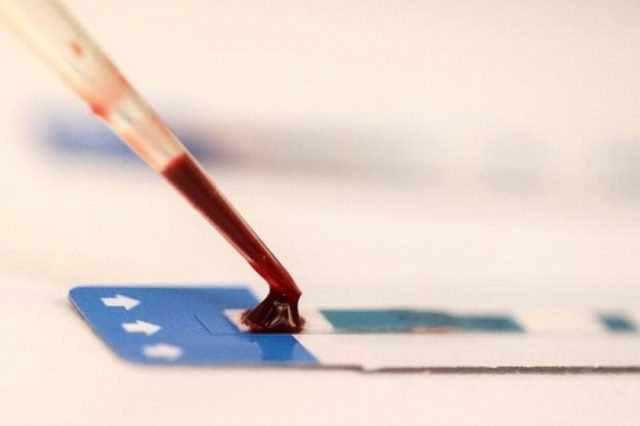World AIDS Day: Know Your Status
Stigma and discrimination need to be challenged from within the communities

A nurse tests a blood sample. PHOTO: REUTERS
In Pakistan, the HIV epidemic disproportionately continues to impact key populations at substantially increased risk for HIV infection, and the APLHIV works every day to fulfil our vision of a society where people living with, affected by or at risk of contracting HIV, live with respect and dignity. If we are to stop the spread of this epidemic, we urgently need to address barriers to accessing information and HIV prevention and treatment services, to ensure that a rights-based approach is taken to recognise the complicated nature of this epidemic.
Correct information is key and we know that knowledge is power and education is indeed a vaccine against HIV. If a person knows his or her HIV status, he/she can make an informed decision on the future course of actions that needs to be taken. As we continue our fight for access, we must ensure that correct information about prevention, testing and treatment is made widely available among at-risk communities as well as among the general population. It is our responsibility to pay close attention to our young people. Today, we are at a critical point where new HIV cases are starting to grow outside of key populations. HIV is a virus that does not differentiate between at-risk communities and the population at large. We call upon our partners in government as well as parliamentarians, media, religious leaders, private sector and civil society organisations to continue to raise awareness and deepen understanding about HIV and AIDS. Together, we must work to remember that the HIV epidemic is relevant well beyond the groups that experience a disproportionate burden of HIV infections.
From prevention to testing to treatment, stigma and abuses of human rights are still among the biggest barriers to the uptake of all HIV services in Pakistan. When we work with our constituents, we hear again and again of discrimination in healthcare settings. Individuals are judged and morally instructed, and some outreach programmes have even reported instances of staff being arrested by the police. Since 2010, Pakistan has seen an increase of 45% in new HIV infections whereas in the last eight years, youth aged 15-24 has seen an increase of 29%. These figures are alarming and we will be unable to stop this epidemic if stigma, discrimination and unavailability of confidential services continue to deter individuals’ pursuit of testing. Human rights, including the right to health, must be upheld at all costs to end AIDS as a public health threat by 2030.
Beyond eliminating widespread information gaps and stigma, it is imperative that we address factors like unemployment, homelessness, lack of education and lack of access to social and healthcare. We need programming that is people-centered, gender-sensitive, tailored to specific needs and inclusive of meaningful participation from each individual community. By ensuring that the most vulnerable and at-risk are absorbed into social assistance programmes, we can address the inequality that ultimately maintains disparities in their access to health.
As we work with our partners in the fight against AIDS, we know that gaining control of the epidemic requires strategic prevention programming coverage for individuals within key populations where the epidemic is concentrated. However, this must happen alongside programmes that address issues of information, access, rights and inequality. Together, our collective commitment can improve the lives of people living with HIV and empower everyone to make dignified choices about treatment and prevention. Stigma and discrimination need to be challenged from within the communities which have a potential in creating enabling environments and ensure easy access to sustained, accessible and affordable services.
Published in The Express Tribune, December 2nd, 2018.
Like Opinion & Editorial on Facebook, follow @ETOpEd on Twitter to receive all updates on all our daily pieces.














COMMENTS
Comments are moderated and generally will be posted if they are on-topic and not abusive.
For more information, please see our Comments FAQ